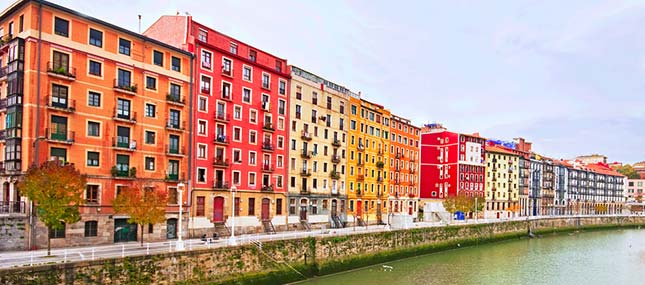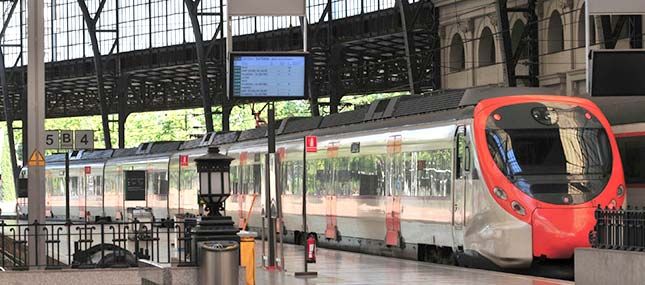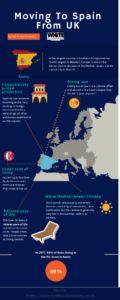Moving to Spain from UK – 19 Things You Need to Know

Last Updated: 1st June, 2021
Moving to Spain from UK is an exciting prospect but there are various things you need to be prepared for.
In this blog post, we look at all the documents you need to bring and the things you need to organise before you whip out your beach towel and settle down for a cocktail on the beach.
In the aftermath of Brexit, lots of Brits are left questioning the likelihood of their dream move to Spain taking place.
It is very important to consider that there have been a number of significant changes to the
Spain continues to be the most popular European expat destination for British families and retirees.
According to UN data, 302,000 of the 1.3 million British citizens living in the EU live in Spain!
Clearly, moving to Spain from the UK remains a particularly popular choice.
There are numerous draws to moving to Spain from UK, including:
- The warm Mediterranean climate
- competitively priced villa properties
- lower cost of living compared with most of the UK
- eating out is cheaper and a cultural tradition: tapas anyone?
- relaxed pace of life: think sleeping siestas on the sand
- working opportunities in IT and consultancy
So what do you need to know?
From buying property to applying for residency permits and ensuring your finances are in order, these tips will come in handy if you’re considering moving to Spain from UK:
Choosing Where to Live

Benidorm, Valencia’s Costa Blanca
Where you choose to live depends on whether you need to be in big cities like Madrid or Barcelona for work.
By far the most popular areas for moving to Spain from UK are the sun-kissed coastal regions.
Alicante on the Costa Blanca is chock-full of beautiful beaches and affordable properties.
Expats report adjusting to life here is made easier by friendly locals and English-speaking schools.
Valencia is Spain’s third largest city and is famous for its classic Paella.
Lots of expats have found good value homes in the mountainous communities surrounding the city.
Further south in the Andalusia region is Malaga; a more laidback city with a mixture of old with new.
Know Your Rights
As of 2021, the UK is no longer a member of the European Union!
Prior to Brexit, Brits had the right to visit, live and work anywhere in European Union.
This allowed British citizens to move to Spain without visa restrictions or maximum stay periods.
However, under post-Brexit rules, the rules for British citizens who want to live in Spain are much very similar as they are for non-European people.
The new rules mean there is now a maximum stay of three months for UK passport holders in Spain.
Anyone hoping to stay longer must legally register as a resident, and any non-resident hoping to work in Spain, could need a visa or work permit.
Finding Work
Most people think the majority of expats in Spain are retirees sunning themselves on the beach.
However, figures published by the Office for National Statistics, indicated that nearly two-thirds of expats living in Spain were of working age.
Spain is still recovering from the fallout of the economic crisis and unemployment, particularly among the youth remains high.
The impact of the pandemic has also had drastic economic implications!
Thus, finding work may be a little difficult.
However it is not impossible!
There are numerous job openings in emerging sectors such as IT and consultancy.
Seasonal vacancies also exist in the tourist and hospitality sectors.
Buying Property

Bilbao, Basque Country
Home ownership is 78% in Spain, higher than in the UK and well above the average across the EU.
A large proportion of Spanish property is owned by foreign investors.
This includes British expats, drawn by low interest rates in the coastal regions, such as the Costa del Sol.
There are a huge range of properties for sale in Spain and some real bargains can be had, although prices vary according to size, property type and location.
As a guide, a 5 bedroom villa in the town of Extremadura, Badajoz, close to the Portuguese border can be purchased for €99,000 (£86,500).
The emergence of the coronavirus pandemic has had a significant impact on economies across the globe.
This is certainly no different in Spain!
According to the latest figures from the Association of Spanish Notaries, house sales to foreigners plummeted by 37% in the first half of 2020 from the year before!
To start your search view available properties on Servihabitat.
Gestors
When buying property in Spain it is advisable to enlist the services of an experienced gestor (importantly not a jester!).
A gestor is not a professional solicitor or estate agent, but a Spanish-speaking clerk with good local contacts.
They liase between you and the Spanish administration to ensure the smooth transfer of property.
Their fees are generally low and they can save you lots of time and hassle.
Word of mouth recommendations are the best assurance of the quality of their services.
For more information on their role and finding a gestor see their official site.
Renting Property
For those moving to Spain from UK and looking to rent, the rental market is very similar to the UK.
Having said that, it is important to do your research beforehand and check your rights as a tenant.
Rental agreements in Spain don’t legally have to be put into writing but it is always advisable to do so.
Short term contracts (contrato de arrendamiento de temporada ), which can run up to a year, generally have less legal protections than longer term contracts (arriendo de vivienda).
As of June 2021, a three bedroomed studio apartment in the capital of Madrid will cost you in the region of €1,591 (£1373) in the city centre.
A similar sized apartment in the heart of Barcelona will set you back around €1,507 (£1300) with prices declining the further outside of the city centre you venture.
Cost of Living
The cost of living in Spain is generally much lower than the UK and many other Western European countries. This is offset slightly however by wages which tend to be much lower as well.
Numbeo, a number crunching website, compared the costs of living when moving to Spain from UK and found pretty much everything is cheaper in Spain.
For example, a meal for two at a restaurant costs £34 in Spain (£50 in the UK), a monthly train ticket costs £34 (£65 in the UK) and combined monthly utilities cost £99 (as opposed to £154 in the UK).
Typical Expenses Living in Spain
Education & Schools
Families moving to Spain from UK will want to ensure that their child receives a good standard of education.
Education in Spain is regulated by the Ley Orgánica de Educación (LOE, Organic Law of Education), and is free for all children aged between 6 and 16 years.
There are various English-speaking schools across the country.
The Spanish Bachillerato is the post-16 stage of education, comparable to the A Levels/Higher (Scottish) in the UK, the French Baccalaureate in France or the International Baccalaureate.
Lots of families, particularly those intending to stay for a short while, choose to send their child to an international school.
Fees at the international schools in Spain vary widely from around €2,000 a year to well over €10,000 a year at senior schools.
Language
Even if you are going to be moving to an expat area of Spain, it is a good idea to brush up on your Spanish language skills before you go.
Those expats that do report high satisfaction levels and easily integrate into Spanish life.
Besides helping you land a higher paying job, learning the lingo will also be of value when navigating the process of buying or renting a house, including the endless paperwork that comes with it.
Language schools can be found throughout Spain.
There are also lots of online courses and popular mobile apps like Duolingo which will ensure you are speaking like a local in no time.
And of course, if you are struggling with the native language in the early stages and want to keep up to date with all things back home, you can always watch Sky tv in Spain by speaking to a reputable IPTV supplier.
Cultural Differences
As is the case when moving to any other country than your own, there are cultural differences and norms you need to be aware of and respect.
The laidback lifestyle in much of coastal Spain means the morning (la mañana) runs until about 2pm.
It’s not unusual for lunches to run for 2 hours late into the afternoon (la tarde).
This all sounds great of course, but if you’re needing to get something done it can get frustrating.
August is virtually a shut down month for the country as well, where everyone packs up and heads to the beach.
Moving or buying a house in these months is very much a no-go!
Healthcare
Spanish healthcare is of a very high standard.
Those working in Spain and making National Insurance contributions are entitled to access public healthcare on the same basis as a Spanish nationals.
For those seeking private healthcare, it is worth considering your options and costings prior to departing the UK as this can prove a great deal more expensive.
Those looking to retire to Spain should note that the NHS stopped reimbursing medical costs incurred by non-working Britons under pensionable age in other European states.
Public Transport

High speed train departing Barcelona station.
If you are moving to Spain from UK and relying on public transport you will find that it is generally of a very high standard.
Most major cities operate tram or bus services to complement an extensive rail network.
The AVE-Renfe high-speed train network in Spain travels between all the largest cities.
It connects the capital city Madrid with Barcelona, Seville, Cordoba and Zaragoza, and allows for travel to France and Portugal.
If you intend to drive in Spain, the country drives on the right hand side. There are also different standards of driving.
For example, it is a commonly accepted practice that you must first flash your lights before attempting to overtake on main roads.
Taxes & Pensions
If you are moving to Spain from UK and plan to live off your British pension, you will need to check your ability to access this and also account for any fluctuations between the Pound (£) and the Euro (€).
To pay tax you will need an NIE number on arrival.
This is issued by the National Police of Spain and is a legal requirement in Spain for anyone who is working or plans to open a bank account or purchase a car.
To obtain your NIE you’ll need to go to the Comisaria General de Extranjeria and take the following documents:
- Your passport, including a copy and photos
- A completed EX-15 form
- A document outlining why you need an NIE
The UK has a double taxation agreement with Spain to ensure that you do not pay tax on the same income in both countries.
You can enquire with the relevant tax authority about double taxation relief.
For those already living in Spain, all existing double taxation arrangements for UK nationals remain unchanged.
As a Spanish resident, you are required to declare your global income to the Spanish authorities, regardless of which country it came from.
Opening Bank Accounts
Before you move to Spain its important that you first get your finances in order.
If you want to open an account before you live in Spain, you may do so as a non-resident.
If you intend to become a permanent resident, you must obtain a Certificate of Residency.
Once you have the certificate, you can ask your bank to change your account with the following documents:
- An EX15 Certificate
- Your Passport
- Your NIE number
Major banks in Spain include Santander, ING Direct and Banc de Sabadell.
Note if you bank with Santander in the UK, you will still have to open a new account in Spain with them.
Transferring Money
The official currency in Spain is the Euro (€).
You can use internationally-recognized credit cards such as Visa and Mastercard in larger shops, restaurants and hotels.
When moving to Spain from UK, ensuring you get the best currency exchange rate is crucial.
Moving large amounts of money, such as when you purchase a new home, could potentially increase your return substantially.
Banks often offer expensive rates when transferring money abroad.
Use trusted FX partners like Frontierpay to compare rates with your own bank and see how much you could save.
Transporting Your Goods
For UK removals to Spain the most common form of transportation is by road.
This is where selecting a quality removals company experienced in transporting goods to Spain is crucial.
Most removals companies will offer a full or part load service.
A full load service is the most expensive but will transport all your belongings in one go on a fixed date.
Whereas, a part load is where you share the consignment with others and receive your goods over a delivery window.
They will be able to deal with any issues that arise such as difficult to move furniture and accessibility issues.
They’ll also advise you as to what documentation is needed to satisfy local customs and duty regulations.
Prohibited Items
Before you move, it is worth checking which items you can’t take into Spain. Some common examples include:
- Alcohol and tobacco items over a certain amount
- Animal skins
- Certain food items, including beetroot and mustard seeds
- Plants without a phytosanitary certificate.
- Sports guns without an appropriate licence
- Certain telecommunications equipment
Your international removals company will be able to advise you as to what goods you can and can’t take into Spain.
And if permitted, what documents you will need to supply the relevant authorities.
Importing Your Car
You can drive a foreign plated car for six months on arrival.
However, after you have been in the country for more than 183 days you must drive a vehicle with the correct registration plate.
Many removals companies offer vehicle shipping services and can take care of export documentation, customs and the observance of local regulations and procedures at destination.
Once you become a resident you have up to 30 days to register your vehicle.
You must submit your vehicle for a Spanish MOT.
Once it passes the test, you will need to get a Spanish licence plate and pay the relevant import tax.
Taking Your Pets
No pet under three months old that has not received the relevant vaccinations can be taken into Spain.
You will need to plan ahead if you intend to take your pet dog, cat or other animal with you.
Your pet must be vaccinated for rabies and microchipped with an ISO 11784/11785 compliant 15-digit pet microchip.
If this is the first rabies vaccination after being chipped, your pet will need to wait 21 days before travelling.
For all the up to date facts about moving to the EU with pets post-Brexit visit the BlueCross website.
For more guidance read our blog post on moving abroad with pets.

Don’t leave me!
Have you moved to Spain recently? Let us know your thoughts or any difficulties you encountered in the comments section below.
Posted in: News
Leave a Comment (0) ↓




